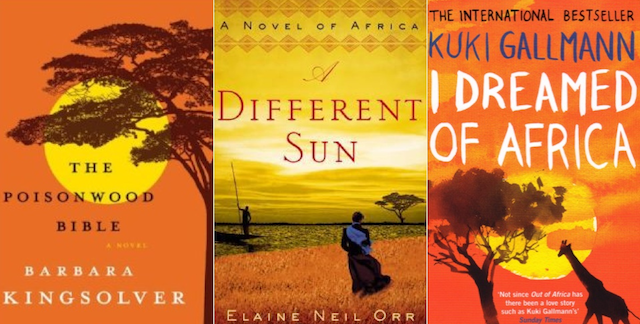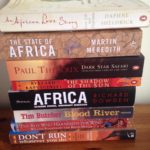There has never been a better time than right now to be a reader of African literature, especially in the United States (historically, an underdeveloped nation in this regard). Of course, we’re still playing catch-up; many of these books have already been published in South Africa, Nigeria, or the UK, or in their original language. But that just means that old classics are becoming suddenly available alongside emerging new voices
March 1: The Lights of Pointe-Noire by Alain Mabanckou (Translated by Helen Stevenson · New Press)
Recently elected a visiting professor at the Collège de France, it has only taken a decade of residence in the United States for Americans to figure out who Alain Mabanckou is—French being one of the most difficult and obscure African languages—but the word is finally starting to spread. His novels are swampy drunken carnivals of language and violence, and they’re as funny as they are dead serious; if he wasn’t getting so respectable and respected, I’d describe him as African literature’s enfant terrible. Following up from Tomorrow I’ll be Twenty, the first volume of his memoir, The Lights of Pointe Noire is an account of Mabanckou’s return to his hometown, after decades abroad. From the opening:
For a long time I let people think my mother was still alive. I’m going to make a big effort, now, to set the record straight, to try to distance myself from this lie, which has only served to postpone my mourning. My face still bears the scars of her loss. I’m good at covering them over with a coat of fake good humor, but suddenly they’ll show through, my laughter breaks off and she’s back in my thoughts again, the woman I never saw age, never saw die, who, in my most troubled dreams, turns her back on me, so I won’t see her tears. Wherever I find myself in the world, it takes just the cry of a cat alone at night, or the barking of dogs on heat, and I’ll turn my face to the stars…
 March 8: What Is Not Yours Is Not Yours by Helen Oyeyemi (Penguin Random House)
March 8: What Is Not Yours Is Not Yours by Helen Oyeyemi (Penguin Random House)
A short story collection from Helen Oyeyemi is an event. No one does the uncanny like she does, or the grisly spookiness of childhood. Get it; read it; tell your friends.
 March 15: Baho! by Roland Rugero (Translated by Chris Schaefer · Phoneme Media)
March 15: Baho! by Roland Rugero (Translated by Chris Schaefer · Phoneme Media)
Only a year or two old, Phoneme Media is already doing an amazing job of finding authors and works from parts of Africa we don’t normally get to hear from. Last year they brought out Inongo-vi-Makomè’s Natives—translated from his Equatorial Guinean Spanish—and this year they’re bringing out the first Burundian novel translated into English. The excerpts I’ve seen are promising, as is this description:
When Nyamugari, an adolescent mute, attempts to ask a young woman in rural Burundi for directions to an appropriate place to relieve himself, his gestures are mistaken as premeditation for rape. To the young woman’s community, his fleeing confirms his guilt, setting off a chain reaction of pursuit, mob justice, and Nyamugari’s attempts at explanation.
(Also watch for Obi’s Nightmare, a graphic novel about a dictator forced to live the horror of being one of his own subjects…).
 March 15: Whitefly by Abdelilah Hamdouchi (Translated by Jonathan Smolin · AUCP).
March 15: Whitefly by Abdelilah Hamdouchi (Translated by Jonathan Smolin · AUCP).
Described as the first Arabic detective novel translated into English, it had me at “spiraling conspiracy of international sabotage on the beaches of Tangiers.” You can read an excerpt here.
 April 1: 100 Days by Juliane Okot Bitek (University of Alberta Press)
April 1: 100 Days by Juliane Okot Bitek (University of Alberta Press)
For 100 days, Juliane Okot Bitek recorded the lingering nightmare of the Rwandan genocide in a poem—each poem recalling the senseless loss of life and of innocence. Okot Bitek draws on her own family’s experience of displacement under the regime of Idi Amin, pulling in fragments of the poetic traditions she encounters along the way: the Ugandan Acholi oral tradition of her father, the poet Okot p’Bitek; Anglican hymns; the rhythms and sounds of slave songs from the Americas; and the beat of spoken word and hip-hop.
 April 1: Collected Poems by Gabriel Okara (Nebraska University Press)
April 1: Collected Poems by Gabriel Okara (Nebraska University Press)
Along with publishing a first book by an emerging new African poet each year, the Africa Book Fund has also committed to publishing a collected edition of “a major living African poet” each year, and this year it is Gabriel Okara, the only person who could ever be called both “the elder statesman of Nigerian literature and the first Modernist poet of Anglophone Africa.” Those who know, know who he is; who no know, go know.
 April 12: Water: New Short Story Fiction from Africa: An Anthology from Short Story Day Africa (Edited by Karina Szczurek and Nick Mulgrew · New Internationalist)
April 12: Water: New Short Story Fiction from Africa: An Anthology from Short Story Day Africa (Edited by Karina Szczurek and Nick Mulgrew · New Internationalist)
This is the third year these good folks in South Africa have collected and published previously unpublished short fiction on a theme, and each year their vision gets broader (and they already have a fantastic track record of discovering hitherto unknown writers). In an interview I did with Rachel last year, she described SSDA’s evolution:
We’d always intended the project to develop organically, though how we thought that would happen turned out to be very different to the end result. I guess we didn’t expect the response to the project that it got. I think, when it started, writers on the continent were looking for somewhere to publish their work, work that didn’t necessarily have appeal to a Western publishing industry that pretty much wanted to tell the same stories the media was telling about Africa. Social media was just a couple of years old and it was either get published in the West, or you were pretty much voiceless. In the first year, we just published an extended circle of writers we knew and writers they knew on a website I’d thrown together. We were email based then. The second year we were inundated with requests from writers to send us their stories, and we started the Facebook page. By the third year, writers beyond Southern Africa were asking to be included, so we changed the name, made a new Facebook page and opened it up to any African writer.
 Apr 15: Tales of the Metric System by Imraan Coovadia (Ohio University Press)
Apr 15: Tales of the Metric System by Imraan Coovadia (Ohio University Press)
There are so many amazing writers coming out of South Africa, and Imraan Coovadia is one of the most daring; his Green-Eyed Thieves is a wicked and weird riff on the crime novel, and from what I’ve heard, Tales of the Metric System will be equally memorable. Since I haven’t read it, and since what I’ve read makes the novel sound very difficult to paraphrase, I’ll hand the mic over to Jeanne-Marie Jackson, who reviewed the novel in an essay for n+1, on “The Novel of Ideas”:
A number of critics have made stock comparisons between Coovadia and the English novelist David Mitchell and the Nigerian Adichie because Tales of the Metric System hops around a lot in time and space. But that’s getting it the wrong way round. The book isn’t about how the world network defines our new reality: it displays Coovadia’s lingering investment in mapping a single nation. He does this across ten different plots divided into sections headed by references variously to their period or setting (“School Time”, “Soviet Embassy”), to a significant object (“The Pass”, “Vuvuzela”), or to a central event (“Truth and Reconciliation”). These sections, each of which appears only once, are arranged in nonchronological order and cover timeframes from 1970, when the metric system was introduced in South Africa, to 1999, which saw the close of the postapartheid Truth and Reconciliation Commission, to 2010, the year of the World Cup.
 April 12: The Reactive by Masande Ntshanga (Two Dollar Radio Press)
April 12: The Reactive by Masande Ntshanga (Two Dollar Radio Press)
This is a novel about AIDS and drugs: set in the period in which the South African government refused to acknowledge the AIDS crisis, it’s the story of a group of young men who sold anti-retroviral medication to those who couldn’t access the medication. As Ntshanga described in an interview with his publisher, Columbus, Ohio’s own Two Dollar Radio:
The ARV crisis of the early 2000’s was one of the more defining historical moments of my generation—followed, now, by the student protests of 2015—and personally, since the project was intended to also educate me about empathy through the process of writing it, it was important for me to find a socio-historical parallel for Lindanathi’s narrative; something that included other people and rooted him within his society. From memory, I remember that time feeling like a post-liberation interregnum, a deadlock that spread a feeling of general malaise as the country became reacquainted again with absolute state power—and its new national identity began to disintegrate.
 April 19: New-Generation African Poets: A Chapbook Box Set: Tatu (Akashic Books)
April 19: New-Generation African Poets: A Chapbook Box Set: Tatu (Akashic Books)
Have I mentioned how much I appreciate what the folks at the Africa Poetry Book Series are doing? In addition to what I’ve already mentioned, they release a box-set of chapbooks each year—one more than last year, each year—which means they’ll have put out 24 chapbooks in only their first three years of existence (seven the first year, eight the second year, and this year, nine). Here’s to 60 more chapbooks in the next five years. In the meantime, buy the first three sets and be the coolest kid on your block.
This year, the chapbooks are:
In Praise of Our Absent Father by D.M. Aderibigbe
The Painter of Water by Gbenga Adesina
The Color of James Brown’s Scream by Kayombo Chingonyi
Asmarani by Safia Elhillo
Survival Kit by Chielozona Eze
Paper Dolls by Lydia Nyachiro Kasese
Dagoretti Corner by Ngwatilo Mawiyoo
The Leaving by Hope Wabuke
 April 26: Ladivine by Marie NDiaye (Penguin Random House)
April 26: Ladivine by Marie NDiaye (Penguin Random House)
Marie NDiaye once told an interviewer that while she would have been glad to claim a dual heritage if she had one—if her Senegalese father hadn’t left her native France when she was very young—Africa was essentially a mystery to her. “African origins don’t mean very much,” she said, “except for the fact that I can’t hide it because of my surname and the color of my skin.” Yet this has never meant that she is not an African writer, but that the reasons for that inevitable, inescapable classification—by libraries, critics, scholars—was something best understood at the level of the mystery itself. And this is where her work lives, in the uncanny half-dreamed viscera of an officially colorblind France, a society where being haunted by green women or turning into a brown dog is as reasonable as having African ancestry.
 May 3: Born On A Tuesday by Elnathan John (Grove Atlantic)
May 3: Born On A Tuesday by Elnathan John (Grove Atlantic)
The rare Nigerian novel set in the (largely Islamic) north of the country, Born on a Tuesday is Elnathan John’s debut as a novelist… though he’s already had a storied career as journalist, blogger, tweeter, short story writer, and all-around infuriator (don’t ask him if he’s one of Chimamanda’s boys). Pa Ikhide’s review is a good place to start.
 May 3: The Queue by Basma Abdel Aziz (Translated by Elisabeth Jaquette · Melville House)
May 3: The Queue by Basma Abdel Aziz (Translated by Elisabeth Jaquette · Melville House)
I rely on M. Lynx Qualey to tell me what Arab literature in English to read, and she has told me to read this one. As another reader describes:
This Egyptian novel is set in an almost present-day Egypt, slightly more dystopian than reality. After a failed uprising, a sinister authority, the Gate, rises to power. The main character was shot during the uprising and is waiting for official permission to have a bullet removed; the novel is, intriguingly, structured using his medical records. My main fear about books from the Middle East is that they’ll be similar to The Kite Runner in tone, mood or style (because it’s a proven genre that sells in the Anglo world, not because all ME writing is actually like that, but this one is published by Melville House and is described as “evocative of George Orwell’s dystopias, of Kafkaesque surrealism, and of the dark satire of Sonallah Ibrahim’s ‘The Committee,” by the translator in a review at Madr Masr so it’s pretty certain to be way better than that.
 May 10: The Curious Case of Dassoukine’s Trousers by Fouad Laroui (Deep Vellum)
May 10: The Curious Case of Dassoukine’s Trousers by Fouad Laroui (Deep Vellum)
Last year, Deep Vellum published Tram 83 and it’s been a runaway freight-train of a hit; this year, they’re publishing the English language debut of one of Morocco’s most prominent contemporary writers, with an introduction by Laila Lalami: “Laroui uses surrealism, laugh-out-loud humor, and profound compassion across a variety of literary styles to highlight the absurdity of the human condition, exploring the realities of life in a world where everything is foreign.”
 June 7: Homegoing by Yaa Gyasi (Penguin Random House)
June 7: Homegoing by Yaa Gyasi (Penguin Random House)
This book is going to be big. Ta-Nehisi Coates’s glowing praise takes up the entire back cover, and the publicity for this book is going to be mayhem.
From Coates’s blurb:
Gyasi’s characters are so fully realized, so elegantly carved—very often I found myself longing to hear more. Craft is essential given the task Gyasi sets for herself—drawing not just a lineage of two sisters, but two related peoples. Gyasi is deeply concerned with the sin of selling humans on Africans, not Europeans. But she does not scold. She does not excuse. And she does not romanticize. The black Americans she follows are not overly virtuous victims. Sin comes in all forms, from selling people to abandoning children. I think I needed to read a book like this to remember what is possible. I think I needed to remember what happens when you pair a gifted literary mind to an epic task. Homegoing is an inspiration.
While you wait, you can read a Yaa Gyasi’ short story “Inscape” here.














